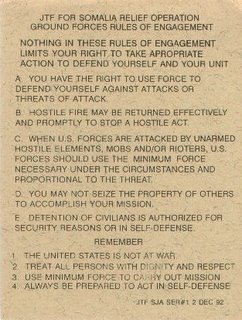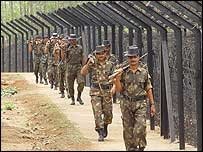Rules & Laws.

This is coolbert:
A person commenting on this blog has asked the question, "is there a difference between the Rules of Land Warfare and the Rules of Engagement?"
The answer is yes.
In a nutshell, the former is LAW, the latter is POLICY.
The former [Rules of Land Warfare] are LEGAL agreements entered into by the U.S. government as part of an international treaty. Treaties based upon the various Hague and Geneva Conventions.
When approved and confirmed, "with the advice and consent of the Senate", all treaties, including those concerning the Rules of Land Warfare, become LAW for U.S. citizens and the U.S. military. Binding legal agreements that must be adhered to. Become a part of the U.S. Constitution having legality as would any other item that is part of that document.
The Rules of Land Warfare consist of written law and unwritten law, the latter sometimes referred to as the usual customs and courtesies of war.
The very language may seem as an oxymoron to some. Courtesies of war??
Yes, they do exist.
Rules and customs and courtesies of war are nothing new. We may think of them as new [the first Hague Convention was held in 1899], but the principles are not.
Even in ancient Greece:
"For instance, every state would tend to all the wounded or ill found on their own territory after a battle, friend and foe alike, and return significantly injured/ill enemy soldiers to their home country at the earliest opportunity . . . No side would knowingly interfere in the care of sick or injured soldiers. For example, a troop of soldiers might pass through an enemy hospital camp on their way to battle, but not harass or threaten anyone in the camp at all along the way.
Teachers, tradesmen, physicians, women, children, slaves, and pack animals enjoy safe passage through areas of conflict (though the normal taxes or fees of peacetime passage could still be demanded, and from time to time mistakes did occur-- but there were stiff punishments for knowingly harming these entities)."
[the above from a prior blog entry of mine.]
We may think of war as being something absolute in nature, but it is not. The object IS to destroy, kill, and defeat your enemy. But this is normally, perhaps never, done with absoluteness. As Clausewitz has said, absolute war is an ideal never achieved for a variety of reasons, to include the "timidity" of man.
War is not anarchy, but is done for valid, reasonable, and sane reasons [some may debate what I have just said]. Ruling bodies WANT to be able to control things in war just as they do in any other human endeavor. To this end, "rules", laws, customs and common courtesies have been observed for a long time. Only in the last one hundred years or so have LAWS actually been promulgated and agreed upon by the international community. Binding to the extent that almost all other international law is binding. Excellent guidelines that instruct HOW war is to be fought and how NOT to be fought. A civilizing influence, to the extent that war can be civilized. A recognition that even in war, there are limits to what can be done.
[even the most vicious of conquerors, such as the Axis powers in World War Two [Japan - - The three All's, "Kill All, Burn All, Destroy All"], or the Mongols, NEVER did seek to totally obliterate and annihilate their opposition. DID desire conquest, submission, tribute, etc., but for the most part not absolute destruction.]
Many of the current Rules of Land Warfare are just intuitive. To include:
* Fair, humane, and decent treatment of prisoners of war.
* Fair, humane, and decent treatment of civilians caught in the cross hairs of battle.
* Flying a false flag or wearing the uniform of the other side [not allowed].
* Taking hostages or using human shields [not allowed].
* Limits as to what type of weapons are to be allowed. [the original Hague Convention outlawed the use of weapons that cause "unnecessary suffering"] Napalm being taken OUT of the arsenals of nations such as the U.S. is an excellent example of where law is taken into account when arming the military of a nation.
The Rules of Engagement refers to POLICIES [not law] that are established by regulation, protocols, and directives.
Can be both permissive and restrictive.
Tells a soldier when TO [permissive] shoot on the battlefield, and when NOT TO [restrictive] shoot.
And when shooting, permits or restricts with what weaponry the soldier can engage the enemy.
Here are some interesting historical Rules of Engagements that clarify the meaning of the term:
"ROE [Rule of Engagement] for Joint Task Force 6, the multi-service command at Fort Bliss, Texas that is the Defense Department's interface with counter-drug U.S. law enforcement agencies.
Personnel WILL make every effort to avoid confrontation or armed conflict with civilians.
Personnel MAY:
Use only the amount of force necessary and proportional to the threat;
Use deadly force in self-defense and in defending others from death or serious bodily injury;
Detain any person posing an imminent threat of death or serious bodily harm, releasing them to civilian LEA [law enforcement agents] as soon as possible;
Pursue armed persons only to defend or retrieve personnel;
Pursue unarmed forces to retrieve military equipment.
Personnel MAY NOT:
Use deadly force to protect property;
Use deadly force if other measures would be reasonably effective;
Enter Mexico or Canada;
Participate in arrests, searches, seizures, or interrogations;
Trespass on private property."
" [from the Vietnam War] a Defense Department cable of September 28, 1964, regarding U.S. air defenses over Laos early in the Vietnam War (as recounted in Daniel Ellsberg's Pentagon Papers):
U.S. air defense forces are authorized to engage and destroy hostile aircraft in Laos. Hot pursuit may be conducted as necessary and feasible over Thailand and South Vietnam.
No pursuit is authorized at this time over North Vietnam or Cambodia except when actually engaged in air combat. No pursuit is authorized into Communist China.
Unless specifically directed otherwise, U.S. air defense forces are not authorized to attack other hostile forces or installations unless attacked first, and then only to the extent necessary for self-defense."
With regard to the current counter-insurgency type of war in Iraq, Rules of Engagement might include:
* If you are in a firefight with insurgents, and the enemy runs into a mosque, you CANNOT fire into the mosque or further assault.
* If you are in a firefight with insurgents, and the enemy runs into a civilian dwelling, you can continue to engage, but only with small arms fire. You CANNOT use close air support or artillery to further attack the enemy in this circumstance.
[there is video on the web of the bird's eye view of a U.S. F-16 jet dropping a 2000 pound bomb on insurgents in the Iraqi town of Fallujah. The pilot requests permission to drop his ordnance before he engages. Permission is given, the bomb is dropped on insurgents running in the street [about two dozen of them], the bomb is aimed and tracked onto the target, with subsequent explosion and total obliteration of the insurgents. One may ask if this was excessive use of firepower? True, the insurgents were all killed from the direct hit. But so must have been a lot of housing and civilians in the area. Folks we purportedly WANT to help!! This is an example of where rules of engagement were in place, referred to, and permission requested and granted.]
Rules of Engagement are used to ameliorate "unnecessary suffering" or damage where it is not desired. Especially in a counter-insurgency environment where you DO NOT wish to alienate civilians with behavior that is callous and extreme. You DO NOT wish for measures that are excessive, EVEN IN WAR!!
The Rules of Land Warfare and Rules of Engagement can never be considered to be a total panacea to the brutality and ruthlessness found in war.
Can and are an excellent source to LIMIT destructiveness and killing.
There will always be violations in wartime of the various Rules. To be expected.
Just as in civil law, we have violations of the law all the time. Civil law has laws against murder, rape, and stealing. And yet, even with laws, violations occur. People kill, rape and steal, law or no law. But the law does give people a framework to tell them how to behave properly, as proper is defined by the society.
War is NOT anarchy!!
coolbert.


















